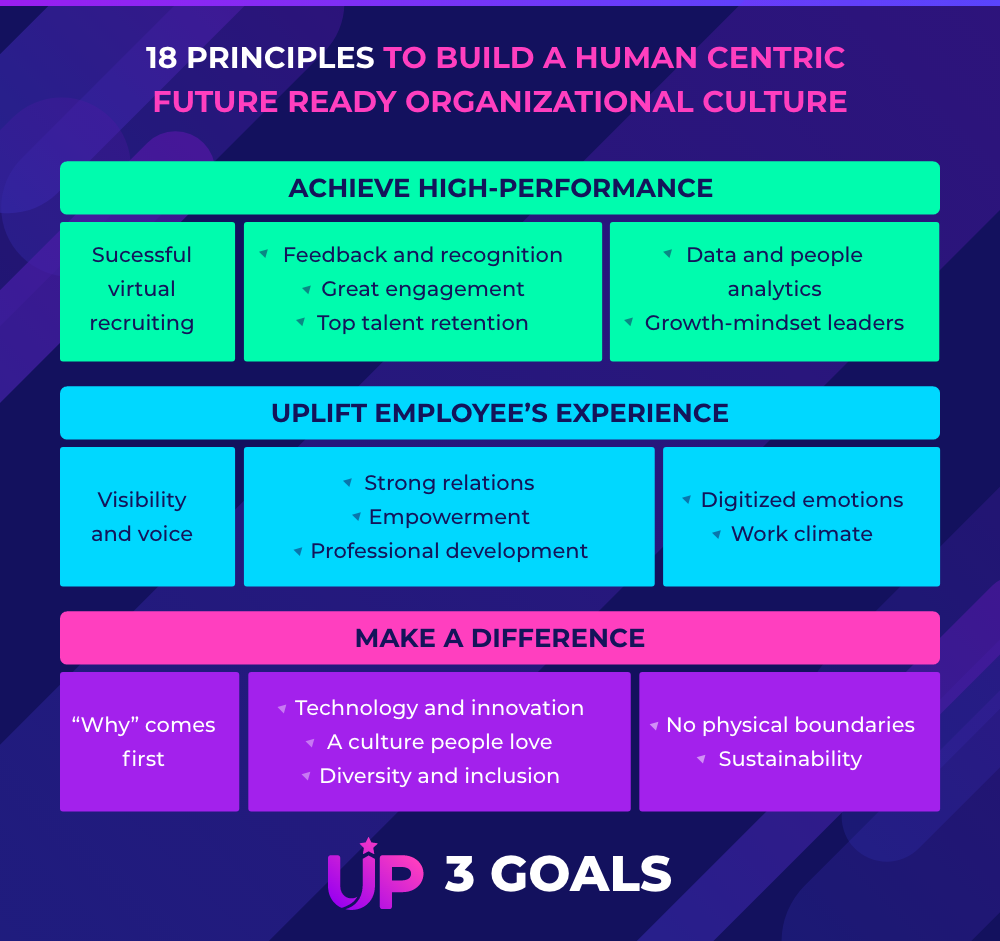Future of Work Trends: Is your Culture Ready?
Written by María Eugenia Raffaele
Where is the future of work taking us, and how ready is your organizational culture for it?
The rapid advance of technologies, globalization, and demographic changes, have always made the world of work undergo transformations. The thing is, however, that the COVID-19 accelerated our journey much sooner than expected, deepening some challenges and offering new opportunities at the same time.
Where are companies standing today? While some have successfully adapted to drastic changes and find themselves ready to embrace future workplace trends, others might find it harder to find their North Star.
So here’s our proposal with this post: Get on board with us and let’s navigate the main future of work trends together. You’ll see the years to come can be promising and exciting for your business as long as you build a future-ready culture capable of taking risks and staying strong through every challenge.
Future of Work: Trends you Can’t Afford to Miss
#1: Flexible and remote work will shape the future
You’d better have a comfortable office chair at home because the hybrid work model is here to stay. Although flexible working was standard long before the pandemic, by 2025 it’s estimated that 70% of the workforce will be working remotely at least some days a month. Plus, Jack Dorsey, the CEO of Twitter has already announced that his employees will be allowed to work remotely for good, together with tech companies like Facebook, Square, and Zillow, which will continue offering flexible possibilities to work remotely regardless of the pandemic.
Challenge: Top managers can’t continue waiting for a “back to normal office scenario”; they will inevitably have to rethink their work model policies. Big companies’ bold moves in this matter are leading employees to demand more flexibility – especially since many have stated their productivity was the same or even higher while working remotely during the pandemic.
#2: From digital transformation by choice to a necessity
I’ve seen this joke many times on social media for the past year.

This is pretty representative of today’s corporate world. Nearly all companies have realized that many activities, when carried out remotely, are more effective, reduce unnecessary expenses and save time. So, becoming digital is one of the top future work trends.
Challenge: While most companies already have the resources to transform digitally, many still ignore the need to shift their “mindset” towards a digital culture that empowers people to make the most of their digital experience.
#3: Understanding Generation Z
The future of work is not ours – it’s Generation Z’s. They are already stepping onto the world stage and their impact in business, technology, environment, politics, consumption and culture will be like anything else. What are their core values, professional development aspirations, working styles, behaviors, and stance on diversity? Z Gens have outstanding soft and hard skills and care about the culture at work. Companies that succeed at attracting them will benefit from their essence by building multi-generational teams with cognitive diversity.

#4: New recruiting strategies
Organizations can now hire employees anywhere in the world. This trend will continue growing and reaching broader and diverse talent outside your local community will imply new recruiting strategies. The world of business will become more competitive, and in order to truly expand their talent and resources, companies will have to optimize time and methods to the fullest.

Challenge: Companies will need to use technology, AI, and recruiting KPIs to plan their search smartly. Plus, the virtual hiring process will imply transmitting cultural values, discussing future goals and professional development opportunities in order to attract new talent, guarantee a successful virtual onboarding experience, and retainpeople over time.
#5: Technology and AI will shape job roles
Driven by the pandemic push, companies around the world have adopted more AI for their business than ever. This is leading to a new change in job roles: Instead of hiring employees with skills to perform permanent office tasks, the trend is to build more knowledge-based and cognitive teams with task oriented skills.
See for yourself:
- Hiring for AI specialists increased by 74% over the last four years and the numbers continue going up.
- The number of people with coding skills is increasing, especially in the case of Z Gens.
- 10% of the US economy is now accounted for by the tech industry.
Technology is already an active part of everyday work dynamics and the more companies embrace it, the more employee upskilling they will be enabling.

#6: Adjustments in leadership and management
Ok, yes. technology is and will be all around us. But, mind you, your teams are made up of human beings, not robots. Responding to human needs, helping individuals grow in all areas of their lives, looking after their well-being and ensuring a high-performance will represent a great challenge for people leading remotely in the years to come.
Gartner pointed out three dimensions that will define the employer-employee relationship in the future of work:

Challenge: Remember trending #3? Your company will be in the hands of the young talent you have today. So, building a solid base of talent ready to be the next generations of leaders is a future workplace trend hard to face, especially for companies with weak leadership.
How to Get Ready for the Future of Work? Culture Comes First
Still on board with us? If you went on reading, here comes the part you’ve been probably waiting for! How to get ready for all this?
The truth is that ‘following’ future workplace trends merely for the sake of ‘not being left behind ’ won’t give you any competitive edge. Actually, you’ll be mostly blending in other than standing out in the world of business.
Along with keeping up with trends, you should also build a future-ready culture in order to respond to challenges standing on solid ground.
Your guiding light to make it happen? Set yourself these 3 goals and nurture their cultural principles everyday.

Easier said than done, right?
I’ll go over the future work trends I pointed out before, followed by shooting questions about your work culture, and some tips you may find useful to start planning ahead!
#1: ‘Flexible and remote work will shape the future’
- Are your teams and leaders ready to stay connected and achieve high-performance while working remotely?
- What tools do you count on to ensure their professional and emotional connection despite their physical distance?
Don’t let remote work make you lose your sense of humanity: Work has moved home, so make your culture feel like home too. Consider adopting digital solutions to keep your teams connected, building genuine relationships based on trust and respect.
If remote work will shape the future of work, then watch out how your remote work culture is shaping the future of your employees. Make sure people love your culture and carry it with them wherever they are. This way they’ll stay engaged and committed. Is this really possible? Sure, it is! Check out this inspiring experience!
#2: The need to transform digitally
- Apart from keeping it digital, are you making your transformation cultural?
- What tools and solutions do you count on to drive a digital cultural change?
Digital cultural transformations require a human approach and solutions tailored to every company’s needs and identity.
Based on your cultural model, look for the solution that suits your mission, vision and values.
Especially with remote and hybrid work models, you’ll need to have end-to-end visibility of your teams to fully understand each individual.
A digital solution like StarMeUp allows organizations to build bonded, collaborative, and empowered cultures, making their digital transformations more human and agile.
#3: ‘Understanding Generation Z’
- How will you understand their needs to offer them the resources they need to develop professionally?
- How will you make them more visible and give them the chance to make a difference?
- How does your company respond and commit to social matters such as sustainability and diversity and inclusion?
Use metrics and People Analytics to gain greater visibility of your employees’ performance and needs. When you get to know them better, you can offer tailored growth opportunities to every individual.
Make sure you carry out initiatives that encourage people to make a difference and stay relevant. You will make future generations and society love your culture!
#4: New recruiting strategies
Apart from recruiting people virtually,
- How will you engage and retain your talent over time?

#5: Technology and AI will shape job roles
- How are you planning to navigate future changes with the right technology?
- Is ongoing learning and professional development a top priority in your company?
Embrace augmented accelerators and disruptors, which use AI to reinvent key aspects of your organization – from processes, to connections and engagement with customers. By harnessing the power of AI and emerging technologies you can optimize your processes and results while moving forward.
Make sure people learn how to use all the technology you adopt in your organization. Offer training opportunities to everyone to reinforce your “ongoing development” cultural pillar.
#6: Adjustments in leadership and management
How can you make sure they won’t lose sight of the human aspect in the daily work routine?

See now? All trends in the world of business are crossed by organizational culture. If you navigate future changes, losing sight of the fact that only culture keeps things moving forward, you’re likely to fail in the short run…
So what’s my conclusion on how to get ready for the future of work? Trends will always change over time, and keeping up with them is essential to stay relevant and competitive. However, planning and building a strong future culture is the milestone to succeed, by keeping your people together and ready to face any challenge.